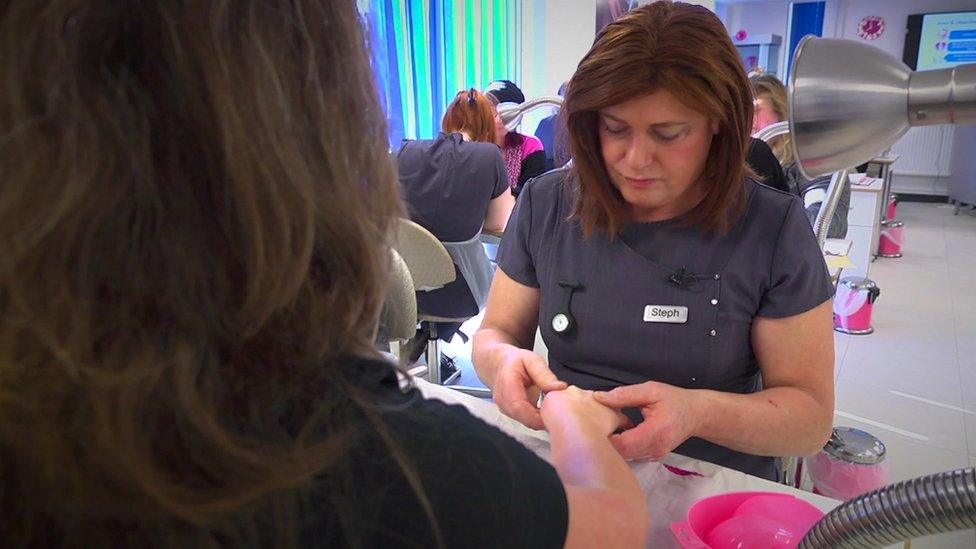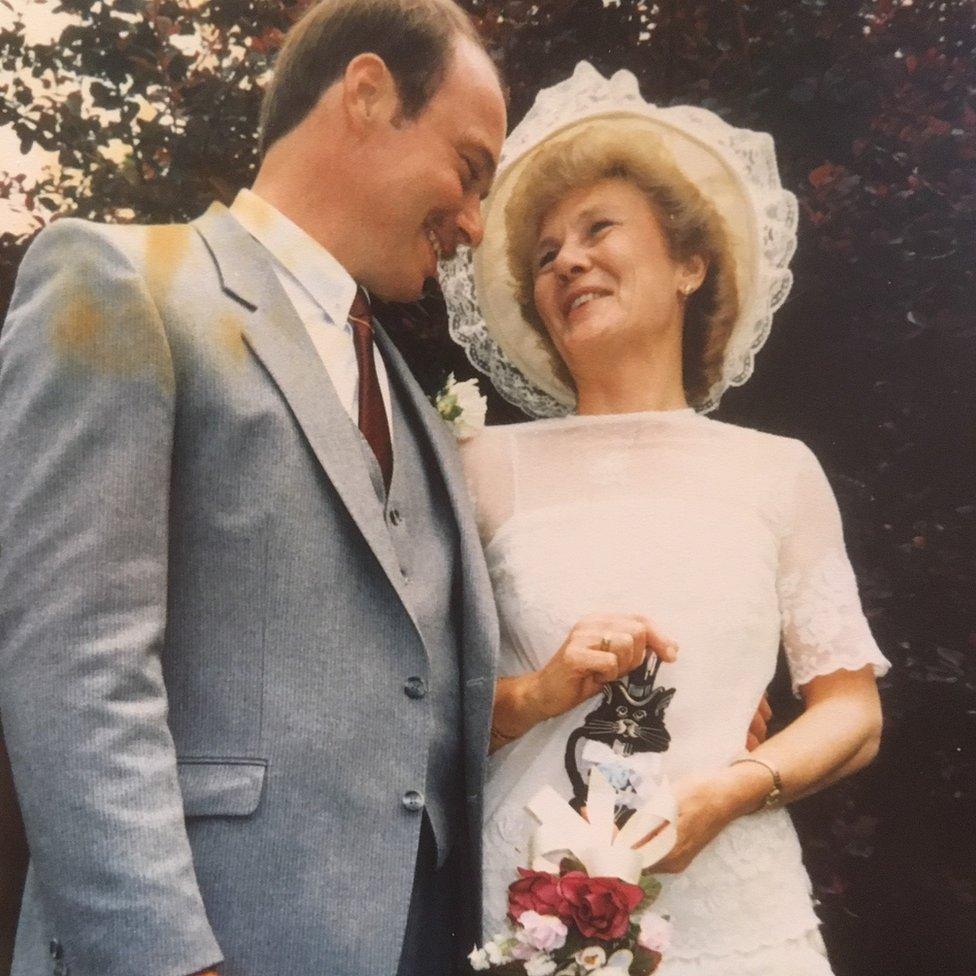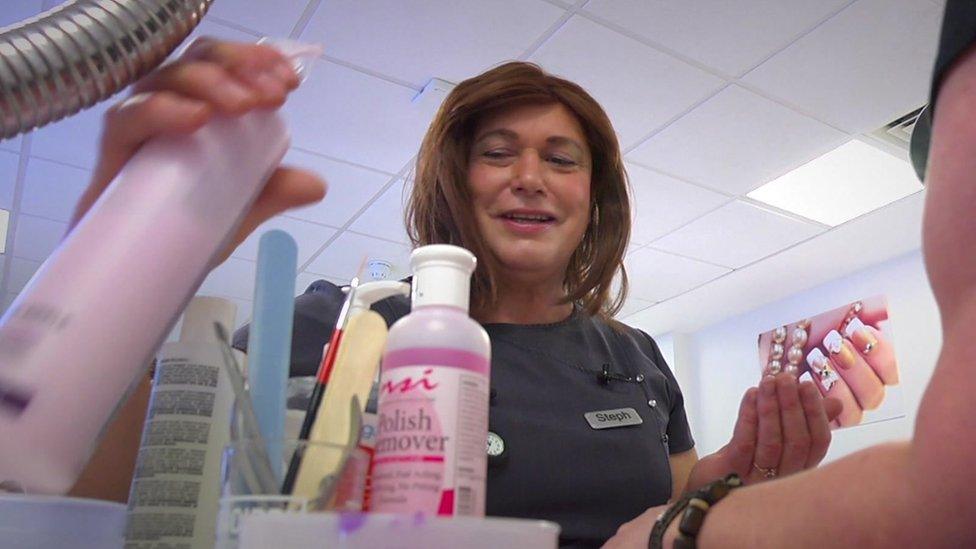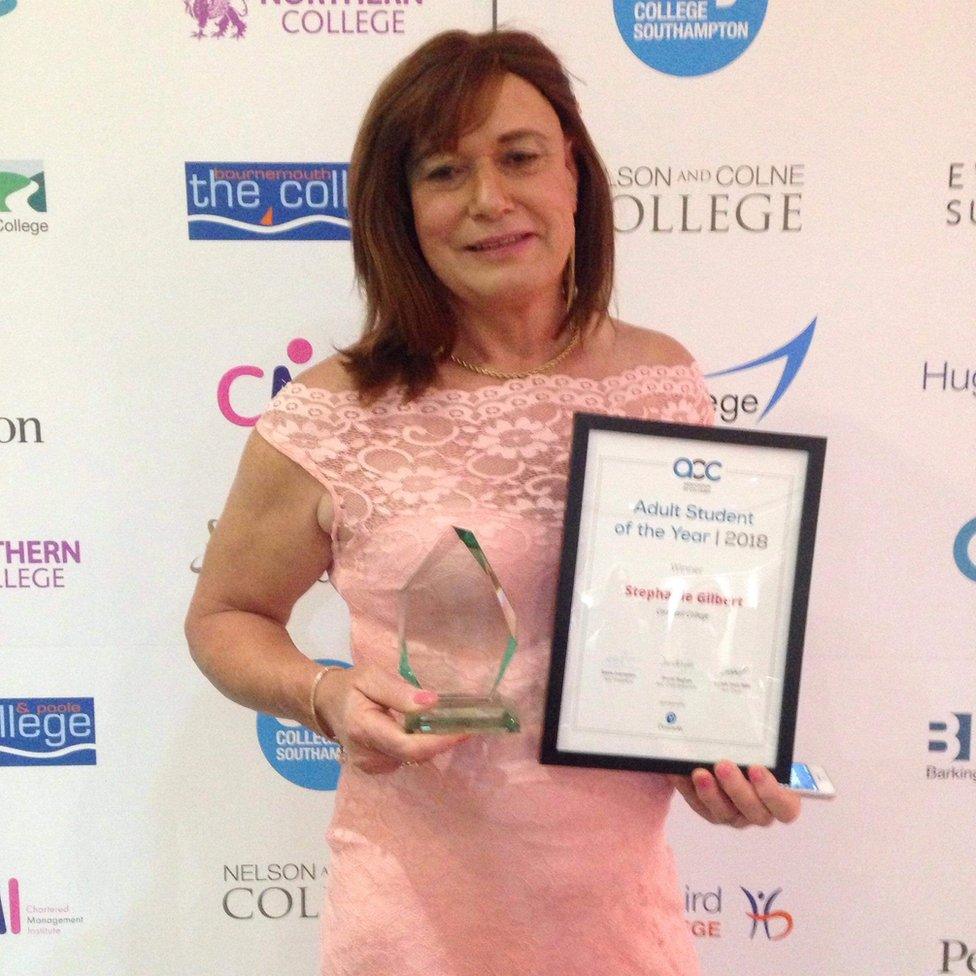'I changed my gender after my wife got dementia'
- Published

Stephanie, a skilled carpenter, has gained beauty therapy qualifications at her local college since her transition
When Steve Gilbert met his wife, Jill, he had just left the Royal Marines, unnerved by a growing realisation that he was attracted to men - "especially the hunky guys".
Almost 40 years on, Jill has dementia and lives in a care home - and Steve, now Stephanie, has had gender reassignment surgery.
"I always felt female," Stephanie says.
"But you learn to hide everything when growing up - to fit in to society."
Steve and Jill were both into sport and fitness when they met, at their local leisure centre, near Redruth, Cornwall.

Steve and Jill on their wedding day
Jill was 18 years older, with three children from a previous marriage, so they decided to just "play it by ear" but as time went on, Stephanie says: "I fell in love with her and it just got deeper and deeper."
Steve told Jill he felt he should be female - but when she told him marriage would change this, he put his misgivings to one side to concentrate on being a good husband and immersed himself in sport.
In his 20s, he was particularly successful at judo, coming third in his weight category in the national judo championships three years running.
But rather than going away, the feeling that he should be female grew - and in his late 40s, he decided he wanted to live as a woman.
"And, of course, that's when the difficulties started in the marriage - arguments," Stephanie says.

Steve immersed himself in sport, coming third in his weight category in the national judo championships three years running
After a referral to a gender identity clinic in Newton Abbot, Devon, Steve was accepted for hormone treatment - but, Jill, then in her late 60s, hated the idea.
They had all but decided to separate but Jill had a series of family bereavements and was also ill herself, with breast cancer and, later, arthritis.
So Steve decided to put transition on hold "until things were sorted out".
"I couldn't put her through it."
Soon afterwards, Jill began to show the early signs of dementia.
"At the beginning, you notice little things... and then you think there's more to it as she repeats herself and then you find that you got like half a dozen tins of mustard powder and loads and loads of kitchen paper but no toilet paper. You think, 'No, something's not right.'"
Jill never recovered properly from a general anaesthetic almost nine years ago and Steve, a skilled carpenter and joiner, whose work took him all over Cornwall, became increasingly concerned about her safety while she was at home on her own.
'Gender neutral'
"In the end, I had to take the knobs off the cooker," Stephanie says.
"It got too much and I gave up work completely to look after her full time."
Giving up work also gave Steve the opportunity to live as Stephanie full time.
"At home, I would just be who I wanted to be and try to look after Jill - but it wasn't brilliant," she says.
"I had to sort of almost be gender neutral so it was indistinguishable. She still had some of her faculties about her."
'Couldn't cope'
Becoming a full-time carer was exhausting. If Jill needed the toilet in the night, she was often unable to find her way back to bed.
"As the illness developed, I ended up getting fine-tuned to her. So as soon as I heard her get up, I'd be awake instantly," Stephanie says.
Eventually, Stephanie became so stressed and depressed that she was admitted to hospital for five days.
Jill's children took over as carers but quickly realised how tough it was and called in social services.
"It sort of got took out of my hands. I knew she was going to have to go into care but it ended up being sooner rather than later.
"I couldn't cope any longer," Stephanie says .
'An inspiration'
With Jill in a care home, Stephanie began to pick up the pieces of her life.
She went back to the gender clinic and was prescribed hormones - and there were other big changes.
"I decided I would pursue my dream of beauty therapy, I'd looked at it previously when I was Steve," she says.
Stephanie was accepted at Cornwall College, which has "a really good diversity policy".
"I think it just helped educate them a bit more," she says, "because, as a trans person, I've always tried to let people know we're just human beings who want to live our lives."

Tutors at Cornwall College say Stephanie is "an inspiration"
Her course tutor, Paula Riley, has described Stephanie as "an inspiration in her open approach to transitioning".
Paula says Stephanie's college work was always exceptional despite the emotional upheaval of gender reassignment and her wife moving into a care home.
In November 2017, at 59, Stephanie finally underwent surgery and returned to the college early in 2018 to complete a course in Swedish massage.
Her resilience led to her being awarded 2018 Adult Student of the Year by the Association of Colleges - and this September she will begin a higher level course in sports massage.

Sadly, Jill's dementia has progressed to the extent that she no longer recognises her spouse of 40 years at all, even if Stephanie wears a short wig and gender neutral clothes.
Stephanie now has a salon in her home and does treatments for friends, including other trans women, but she still makes her living as a carpenter and joiner on building sites, as the pay is so much better.
She finds the work tough as the hormone therapy means she has lost a lot of strength, but still displays the tenacity and humour that made her so popular at college.
"I'm back on the building site, educating the guys, winding them up something rotten," she says.
"It's like, oh, they just really cringe and I say, 'Haallo!'
"I've got to be careful I don't get done for sexual harassment. It's so funny. We have a good laugh."